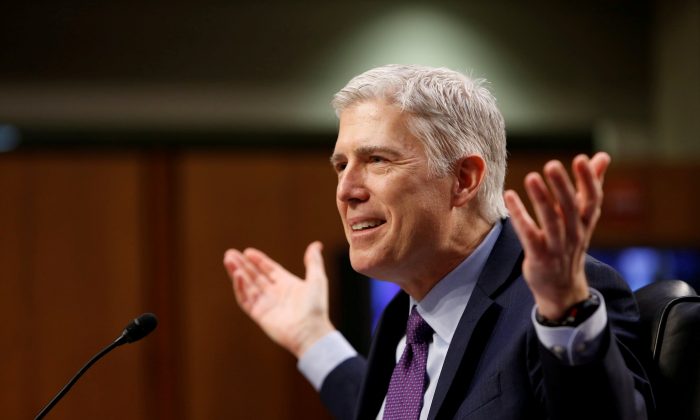Commentary
The concept of deregulation has resurfaced, largely due to Elon Musk’s advocacy for it as a key factor in revitalizing America’s prosperity. The consensus is clear: there are too many regulations, laws, and rules in place. The complicated, costly, and internally contradictory regulatory framework that has evolved over the years is universally disapproved.
Justice Neil Gorsuch’s new book, titled “Over Ruled,” sheds light on how government intervention restricts the freedom guaranteed to us in the United States.
“The truth is, something’s happening in our country,” he writes. “Law is proliferating, and its requirements are becoming increasingly complex. Ordinary people are often caught off guard, and even experienced lawyers, lawmakers, and judges struggle to navigate the complexities.”
“At its core, the legal framework in our country has expanded exponentially. While Congress may struggle to pass legislation, the sheer volume of laws has skyrocketed. From a single volume a century ago, the U.S. Code has grown to 54 volumes and approximately 60,000 pages by 2018. Congress now introduces an average of 344 new laws each session, totaling about 2 to 3 million words of new federal law annually. The length of bills has also increased significantly—from an average of 2 pages in the 1950s to 18 pages today.”
“However, these numbers from Congress only scratch the surface. Federal agencies also play a significant role by issuing new rules and regulations to implement or interpret congressional laws. Many of these regulations carry the weight of law.”
Some time ago, I began to notice that household items were not functioning properly. Showerheads, toilets, and garbage disposals are federally regulated to limit their efficiency due to mandated designs and blueprints.
The new gas cans are subpar compared to the older versions, which now fetch a higher price. While mowing the lawn, I encountered repeated clogging issues due to airflow restrictions imposed by safety regulations, hindering the machine’s performance.
Almost every product we use, be it in our homes or businesses, is subject to federal, state, and local regulations, down to the fabric of restaurant aprons. Real estate developers attribute the housing shortage to stringent controls at every stage of construction and hiring, resulting in higher costs and limited options for buyers.
Gorsuch highlights, “By federal mandate, macaroni must have a specific diameter, as must vermicelli. These regulations extend to every item in the grocery store, affecting the composition and quality of products.”
The regulations also impact agricultural practices, making it difficult for small farmers to compete with agri-businesses. Elon Musk has faced delays in his projects due to excessive regulatory requirements, demonstrating the stifling effect of regulations on innovation and progress.
The regulatory environment poses significant challenges for businesses, diverting resources and attention away from serving customers towards compliance and administrative duties. The bureaucratic hurdles can be daunting, leading many aspiring entrepreneurs to abandon their ventures.
Regulatory bodies continuously introduce new rules without considering the economic impact or job creation, adding layers of complexity and costs to businesses of all sizes. The burden of compliance weighs heavily on industries, requiring substantial investments in legal and consulting services.
Stories abound of individuals giving up on their entrepreneurial dreams due to the overwhelming regulatory landscape. The never-ending cycle of rules and regulations stifles innovation and economic growth, hindering businesses and individuals alike.
The United States has established entire industries dedicated to ensuring compliance. The term “deregulation” does not fully capture the extent of what is needed. A substantial reduction in regulatory codes is required, which should be a legislative effort rather than a judicial one, as stated by Gorsuch. In the late 1970s, bipartisan efforts led to the successful deregulation of the trucking, energy, and telecommunications industries, resulting in prosperity in the 1980s.
The negative connotation associated with deregulation stems from the financial deregulation of 1983, particularly in the banking sector, which was blamed for subsequent crises. The issue of “too-big-to-fail” was exacerbated by the Federal Reserve, leading to a loss of credibility in the concept of deregulation.
Despite challenges, deregulation can still be beneficial without government intervention. Professional oversight organizations and market-based regulation, such as Underwriters Laboratory (UL), play a crucial role in ensuring safety and quality standards.
Market-based forms of regulation, such as reputation and user reviews, can also contribute to maintaining quality standards. The elimination of agencies and laws that facilitate agency capture by large corporations is seen as a solution to regulatory challenges.
The push for genuine deregulation is welcomed, as agency compliance hinders free enterprise. A significant reduction in the regulatory state is necessary for economic freedom and growth. While achieving a complete overhaul may not be feasible in a short timeframe, steps must be taken towards reducing regulatory burdens and promoting economic liberty.
The opinions expressed in this article are those of the author and do not necessarily reflect the views of The Epoch Times.
Source link








